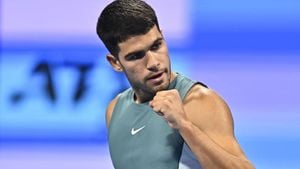Akim Aliu, the former NHL player known for his outspoken views on racism and diversity within hockey, recently took to social media to criticize fellow ex-NHL player P.K. Subban. The criticism arose from Subban’s seemingly favorable remarks about President Donald Trump just prior to the highly anticipated Four Nations championship game between the United States and Canada.
Subban, who works as an analyst for ESPN, shared on X (formerly Twitter) President Trump’s call to Team USA, saying, "The Trizzy Train could be coming through soon... Stay tuned!" This playful remark followed Trump’s comments implying Canada might become the "51st state" and referring to Canadian Prime Minister Justin Trudeau as "Governor Trudeau." Such comments have historically stirred controversy and discontent among Canadians, particularly during heightened political tensions.
Aliu did not hold back, responding with strong words describing Subban as "a sellout of the highest proportions". He expressed his frustrations by stating he had refrained from speaking out previously out of respect for Subban's family. "I’ve watched you from afar and never said anything for two main reasons. One being the respect I have for your brothers and parents and two, I’ve always wanted to keep the infighting between folks of color to a minimum," Aliu posted. His message emphasized disappointment over what he perceives as Subban’s failure to leverage his platform for good.
Aliu continued to lambast Subban, saying, "You were a hell of a player and instead of using your platform you did everything to gain acceptance and popularity, nothing with you has ever been genuine but transactional and usually for publicity reasons." Aliu argued Subban took the wrong side during times of political and social sensitivity, indicating he chooses monetary gain over moral integrity.
Fans and observers were quick to react to the fallout from Subban’s post. While some supported Aliu for speaking out against what they viewed as problematic behavior, others defended Subban’s freedom of expression. Controversy brewed as the two players, both Canadian by birth, represent contrasting perspectives on nationalism and activism. Aliu has been vocal about systemic racism within the sport, founding the Hockey Diversity Alliance after confronting racism during his career, including traumatic experiences with racial slurs from former coaches.
This incident isn’t just about hockey; it reflects broader societal issues of representation, race, and the responsibilities of public figures. Aliu’s remarks about Subban resonate with many who feel disillusioned when prominent figures fail to address racial injustice effectively. He remarked, "You are the perfect example of why people of color haven’t progressed at the highest levels of society," reflecting deep frustrations about visibility and support for diversity within the sport.
Subban, for his part, has yet to publicly respond to Aliu's accusations. His silence raises questions about his stance on the serious allegations being leveled against him. Critics wonder whether he will clarify his comments and intentions or whether he will continue to navigate the waters of celebrity and politics without addressing the tension he has sparked.
The Four Nations championship game, the backdrop to this drama, is expected to attract significant attention, adding fuel to fiery debates about hockey culture. Historically, rematches between Team USA and Canada have been marked by intense competition. Fans will be watching not just for the game's outcome but for any potential consequences of the public spat between two notable figures from the hockey community.
Playing against the backdrop of political commentary and social responsibility, Aliu’s sharp critique undoubtedly adds complexity to the narrative surrounding Subban’s recent remarks. The hockey world continues to grapple with its own identity and the challenge of ensuring voices advocating for change are amplified rather than ignored.
The fallout from this exchange serves as more than just gossip among athletes; it symbolizes the need for representation and accountability. On the eve of the championship game, as eyes turn to the rink, many are also focused on the players’ responsibilities as ambassadors of their sport, both on and off the ice. This clash of opinions is likely to spark conversations long after the final whistle blows, echoing the larger conflicts at the heart of Canadian and American relations dealings.



